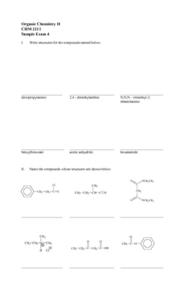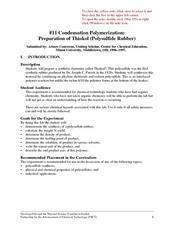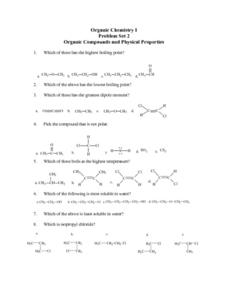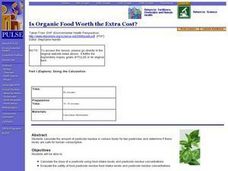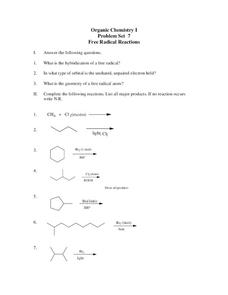Curated OER
Organic Chemistry I: Problem Set 17-alkenes
In this organic chemistry of alkenes worksheet, students name and write the chemical formulas for 12 alkenes and then complete 3 short answer questions about the saturation of alkene compounds.
Curated OER
Organic chemistry I-Problem set 22-Alkynes
In this organic chemistry of alkynes worksheet, students write the reactions needed to convert a carbon compound to a different carbon compound in 15 questions.
Curated OER
Organic Chemistry I: Problem Set 21- Alkynes
In this organic chemistry of alkynes worksheet, students write products for reactions in 9 equation problems. They show the synthesis steps for 3 reactions and write the names for 3 compounds.
Curated OER
Organic Chemistry I: Problem Set 23: Conjugated Dienes
In this organic chemistry of dienes worksheet, students write the structural formulas for the products in 19 reactions of dienes in the presence of other compounds.
Curated OER
Grade Improvement Options for Organic Chemistry - MCAT Exam Questions
The first two pages of this resource may not be useful as they contain a narrative as to how someone can improve their grade on an organic chemistry exam. The final page, however, contains four sample MCAT exam questions. You could use...
Curated OER
The Influence of Initiator Concentration on the Molecular Weight of Polystyrene
This in-depth organic chemistry lab walks learners through an investigation of the effect of initiator concentration on the resulting molecular weight of polystyrene. It is important that you use this lesson with experienced chemistry...
Curated OER
Condensation Polymerization
This organic chemistry lab activity is appropriate for teaching polymerization, percent yield, melting point, or the types and uses of polymer materials. Chemistry pupils imagine that they are working for a company to develop a special...
Curated OER
Organic Chemistry II
In this chemistry worksheet, students write the structures for the compounds illustrated on the sheet. Then they name the compounds whose structures are illustrated in part two. Students also fill in the blanks to complete the paragraph...
Curated OER
Organic Chemistry II Exam 3
In this chemistry worksheet, students determine which compound is the most acidic in each multiple choice question. Then they determine what the major product would be in each of the reactions stated on the sheet.
Curated OER
Organic Chemistry II Exam 4
In this chemistry worksheet, students write the structures for the compounds listed at the top of the sheet. Then they name the compounds whose structures are illustrated. Students also write the mechanism for the reaction of methyl...
Curated OER
Condensation Polymerization: Preparation of Thiokoll® (Polysulfide Rubber)
This lab activity is geared toward experienced chemistry learners, in particular, those who are familiar with organic chemistry. They will create a synthetic elastomer and then make observations and measurements of its different...
Curated OER
Metals and Hydrogen Cars: Chemistry 10-12
Students investigate which metal is best to use as storage material in hydrogen cars. In this chemistry activity, students differentiate endothermic and exothermic reactions. They write a reflection paragraph about what they learned in...
Curated OER
Organic Compounds and Physical Properties
In this chemistry worksheet, young scholars identify which has the highest boiling point, as well as the lowest. Then they identify which compound is least soluble in water and why. Students also classify each of the compounds listed on...
Curated OER
Addition Polymerization: Preparation of Polystyrene Using Two Types of Initiators
Advanced chemistry classes compare the polymerization of styrene using two different initators: benzoyl peroxide and aluminum chloride. Once they synthesize polystyrene, they compare the two producet for melting point and density. There...
Curated OER
Alkene Addition Reactions-Problem Set 18
For this organic chemistry worksheet, students complete 10 questions in which they identify the structural formulas for the products of reactions.
Curated OER
Is Organic Food Worth the Extra Cost?
High schoolers calculate the amount of pesticide residue in selected foods for two
pesticides and determine if these levels are safe. They read an article about a
research study looking for metabolites of these pesticides in children....
Curated OER
Polymers all Over the Place
Students investigate properties of common molecules. For this chemistry lesson, students construct polymer models to gain a better understanding of the properties of polymers.
Curated OER
The Right Chemistry
Students see that chemistry is the study of matter, how matter reacts and combines to create new chemicals, the changes that take place in matter and what makes up matter. This lesson provides many good ideas across the curriculum to...
Curated OER
Determination of Plasticizer in PVC
Students isolate and determine the amount of plasticizer in polyvinyl chloride. They use Infrared Spectroscopy (IR) or Fourier Transform Infrared Spectroscopy (FTIR) and gravimetric techniques in this experiment.
Curated OER
Free Radical Reactions
In this chemistry worksheet, students look at the diagrams for the chemistry reaction. Then they write down the correct chemical reaction.
Curated OER
BioFuels: The Chemistry and Economics of Alternative Fuels
Junior chemists manufacture biodiesel in the lab. For this exercise, they check the purity of the biodiesel using thin layer chromatography. They also calculate its density and heat of combustion. They are sure to rise to the...
Virginia Department of Education
Acid-Base Theory
Litmus paper, why so blue? A chemistry instructional activity includes a pre-lab activity, practice calculating pH, an experiment measuring the pH in acids and bases, a titration demonstration, and a titration experiment.
Curated OER
What can I do?
Pupils identify feelings and explore positive ways to handle conflict. In this mental health lesson students discuss feelings and how to constructively handle them.
Curated OER
Chromatographic Separation of Methylene Blue and Sodium Fluorescein
Students determine the best solvent system for separating a methylene blue/sodium fluorescein mixture by thin layer chromatography. They conduct an initial TLC separation using ethanol and a different solvent mixture and analyze the data...











